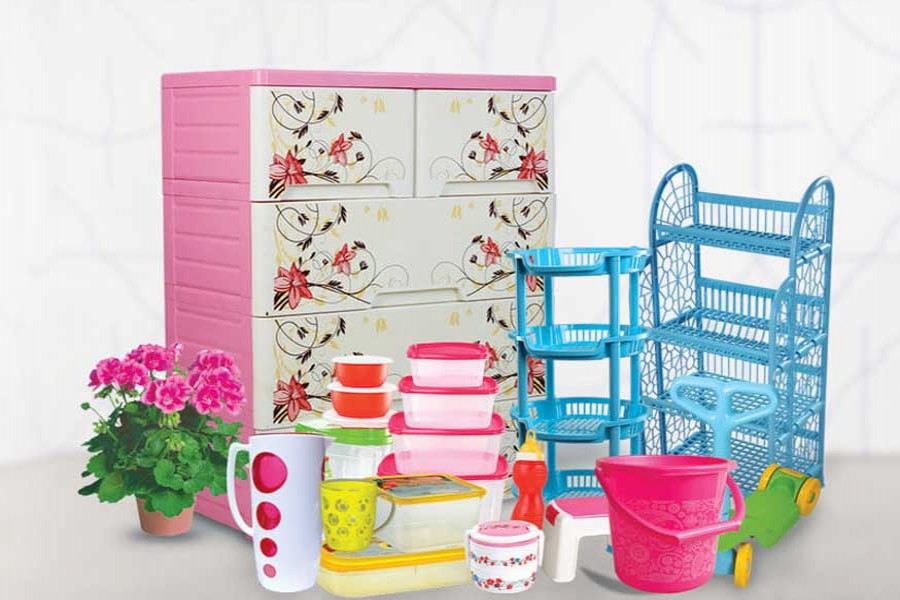A recent news item that a state-of-the-art raw material producing plant for plastic goods has gone into operation on the outskirts of the capital might have attracted the attention of many. Among the raw materials-- PVC and PET resin, the key ingredients for scores of plastic products for which the country is entirely import-dependent, will now be produced in the plant-- that too in a big scale. This is a piece of good news, and the reason for it being so is the ever-increasing demand for environmentally-safe plastic products in the global market. The availability of quality raw materials locally is likely to boost production of myriad varieties of plastic products for both domestic and export market.
The country's export of plastic goods has been growing. However, the figures are not big enough to evoke great optimism. The fact remains that in Bangladesh, plastic plants have only recently opted for modern technology in producing various food and non-food grade products. With more technology back up, and accompanying diversification, the industry -- though scattered and even disorganised -- has the potential to grow extensively if provided with the required facilities. This may open up a new vista for exporting.
It may be noted that the export of plastic goods was far from the targeted goals of the industry even a decade back, though there were few enterprises that used to export in small volumes. Mainly it is the local demand that motivated factories-medium, small and very small-to produce plastic products.
The annual sales of plastic products are currently estimated at around Tk 150 billion in the local market, in which household items account for nearly Tk 20 billion. Increase in domestic supplies reportedly grew at 15 per cent a year over the last several years. Industry insiders, as quoted in recent newspaper reports, said the sector is experiencing fresh investment to the tune of Tk 1-1.5 billion each year. The country's plastic sector is said to employ around 1.2 million people directly or indirectly in well over 4,500 small, medium and large manufacturing units. Value addition in manufacturing is also commendably high, ranging between 50 and 70 per cent. At present, around 5000 factories are producing plastic products in more than a dozen categories.
Use of plastic products in the country has grown manifold thanks to the dynamic improvements in recycling technology-- a key stimulus in increased production on the one hand and growing consumer preference on the other. However, lack of up-grading the quality and diversification in product range is commonly attributed as the main impediment to the sector's growth to a far higher level. This holds true in respect of production for domestic consumption as well as exporting.
Despite the progress, concerned quarters consider this far from what it actually should be in view of the overwhelming surge in global demand. Major improvements in infrastructure, waste management, recycling and skills development are some of the critical areas in need of urgent attention to push the growth momentum to the desired level. In addition to these basics, product development and product adaptation should be attended to as a matter of priority. This, unfortunately, is an area many of the manufacturers miss out resulting in less than expected success in accessing overseas markets. Global market of plastic is essentially demand-driven. Price structure of plastic products is highly wide-ranging, able to absorb immensely diversified products by the low, middle and up-end market segments.
Plastic industry, unlike most other industries, invites arguments both for and against the basic premise -- its presence as an evil or a blessing. The negative attitude is largely because of the many ill-effects that are almost integrally linked to it. Currently, there are efforts, globally, towards cutting down the ill-effects, and one hopes these succeed to the benefit of billions of people dependent of plastic products all over the world. Thus while one speaks about plastic, there are other things that come up too. One such is the poor or inadequate recycling of plastic wastes. This is a scenario common to most developing countries, and Bangladesh is no exception.
While pollution caused by plastic waste is tormenting for the environment including aquatic resources necessitating urgent action, the reason why this manufacturing sector needs better management is increasingly felt at home and abroad. The Ministry of Industries has prepared the draft 'National Plastic and Packaging Industry Development Policy 2019' with short and long-term action plans for the development of the growing sector. The draft is reportedly awaiting government's nod. With the draft expected to be cleared soon, the industry will hopefully attract more attention that it urgently deserves, and measures and facilitations envisaged in it should initiate appropriate moves from both the concerned government agencies as well as the industry itself.


